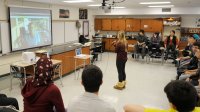Leveraging Guest Speakers to Increase Student Learning
Guest speakers can share their work experience to show high school students how their studies connect to the world outside school.
Working in a vocational high school, I often see my colleagues bringing in guest speakers to collaborate with students to enhance learning. I also see the students’ excitement when they come to my class sharing their experience with the guest speaker.
When I started to explore how my classroom could leverage guest speakers, I found myself asking, “Where will I find these speakers?” “What is the cost?” and “How will I get them to my classroom?” These questions were some of my biggest challenges, but through research and networking, I was able to build a portfolio of guest speakers.
Guest speakers are fundamental in breaking down the barriers of the classroom walls to deepen learning. The experience gives students the opportunity to connect with professionals and create meaningful learning connections. When I plan for a guest speaker to come into my classroom, I see it as an opportunity for students to practice professionalism and critical thinking.
Each guest expands on the current knowledge of my students to a deeper level. To start, my students spend time researching the speaker and connecting the speaker to the content. Students understand the purpose of the guest speaker and create questions to ask during the session. I also assign students roles during the session, such as the following:
- Moderator: Keeps the discussion going, fills any dead space, and runs our class.
- Note taker: In charge of recording our session with typed notes. Students will often refer back to these when reflecting or working on a project.
As the teacher, I video-record the session for future reference.
When and How to Incorporate Guest Speakers
Carefully selecting the time to host a speaker is key. Based on the goals, incorporate guest speakers at the beginning, middle, or end of a unit or project, as each time frame provides a different benefit. A guest speaker during the introduction of material allows students to jump into the content and skills. For example, professional podcaster Jeffrey Bradbury introduced the topic of what podcasts are and how to make one before my students created a podcast for a project examining how a speaker persuades their audience and presents information.
In the middle of a project, students can use the speaker’s information to enhance the work and use feedback to dive deeper. Hannah Berk from the Pulitzer Center introduced ideas about writing about important topics concerning our local community, offering feedback as students wrote letters for global change.
At the end of a unit, a guest speaker can provide closure and an authentic assessment for students. A children’s book author discussed with my high school students how to build figurative language and helped them reflect on the final drafts of their own children’s books that they sent to an elementary school.
Other speakers have included writers from local newspapers, museum managers from the New Jersey Historical Society, a business professional to discuss writing proposals, and, when we were reading a dystopian novel, a local mayor to discuss how to build community.
Also consider interdisciplinary connections; a topic or unit may lend itself to a deeper connection to another subject. For example, I’ve invited scientists such as Emma Harding, who focuses on the evolution of viruses by studying viral fossils in our DNA, to discuss bioethics and research while students read Frankenstein and wrote a research paper. Harding is from Australia, so the international connection had my students even more engaged.
Although my purpose is for my students to learn more about bioethics and the writing process, students walk away with so much more. As an English teacher, my goal is to make numerous connections to other subjects and the outside world. Connecting with professionals in other fields further demonstrates the need for language arts to my students.
To plan a successful event, connect with the guest speaker to share the expectations, content, and structure of the session. The power of video calls has opened so many doors for speakers. With the different video call services, the number of guest speakers has increased. Video calling also eliminates the need for a speaker to travel, creating endless opportunities to connect throughout the world. When discussing the format with guest speakers, I often use Zoom or Google Meet because of my familiarity with and easy access to both platforms. Other platforms include Skype, Microsoft Teams, WhatsApp, and Slack.
How to Find and Contact Guest Speakers
Several programs connect with experienced professionals who will volunteer their time for free. The first program is Skype a Scientist, which allows you to choose from a myriad of scientists. Finding authors who will speak for free can be a challenge. Some publishers have a list of authors who will Zoom for free for at least 15 minutes.
Additionally, contacting your school district’s local library can lead you to authors willing to speak for free. I’ve contacted the local library about authors in the area and different programs the libraries present. Another connection you can make is with local museums. I’ve worked with our county’s museum so my students can learn more about our local history in order to nominate someone for the New Jersey Hall of Fame.
Other platforms, like Nepris and SpeakerHub, offer guest speakers who range in cost but have a no-cost search option. Networking, however, is also key to finding professionals. Surveying your students’ parents or school community helps build your network. Parents are often more than willing to either volunteer their time or connect you with someone. Additionally, social media can help connect you with possible speakers. A simple post on Facebook can lead to many opportunities.
While the pandemic has been challenging in many ways, it has allowed an easier way for others to connect to our classrooms. Consider how your students can experience the magic of a guest speaker.
